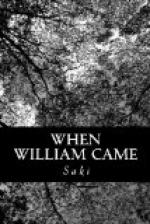Yeovil said something which was possibly the Buriat word for the nether world. Outside in the neighbouring square a band had been playing at intervals during the evening. Now it struck up an air that Yeovil had already heard whistled several times since his landing, an air with a captivating suggestion of slyness and furtive joyousness running through it.
He rose and walked across to the window, opening it a little wider. He listened till the last notes had died away.
“What is that tune they have just played?” he asked.
“You’ll hear it often enough,” said the doctor. “A Frenchman writing in the Matin the other day called it the ’National Anthem of the fait accompli.’”
CHAPTER IV: “ES IST VERBOTEN”
Yeovil wakened next morning to the pleasant sensation of being in a household where elaborate machinery for the smooth achievement of one’s daily life was noiselessly and unceasingly at work. Fever and the long weariness of convalescence in indifferently comfortable surroundings had given luxury a new value in his eyes. Money had not always been plentiful with him in his younger days; in his twenty-eighth year he had inherited a fairly substantial fortune, and he had married a wealthy woman a few months later. It was characteristic of the man and his breed that the chief use to which he had put his newly-acquired wealth had been in seizing the opportunity which it gave him for indulging in unlimited travel in wild, out-of-the-way regions, where the comforts of life were meagrely represented. Cicely occasionally accompanied him to the threshold of his expeditions, such as Cairo or St. Petersburg or Constantinople, but her own tastes in the matter of roving were more or less condensed within an area that comprised Cannes, Homburg, the Scottish Highlands, and the Norwegian Fiords. Things outlandish and barbaric appealed to her chiefly when presented under artistic but highly civilised stage management on the boards of Covent Garden, and if she wanted to look at wolves or sand grouse, she preferred doing so in the company of an intelligent Fellow of the Zoological Society on some fine Sunday afternoon in Regent’s Park. It was one of the bonds of union and good-fellowship between her husband and herself that each understood and sympathised with the other’s tastes without in the least wanting to share them; they went their own ways and were pleased and comrade-like when the ways happened to run together for a span, without self-reproach or heart-searching when the ways diverged. Moreover, they had separate and adequate banking accounts, which constitute, if not the keys of the matrimonial Heaven, at least the oil that lubricates them.




